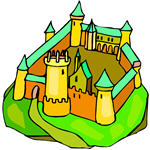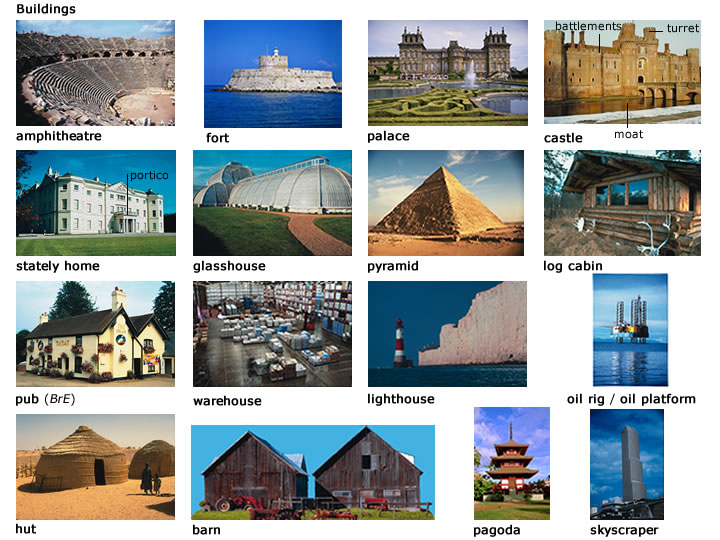|
Từ điển Oxford Advanced Learner 8th
 castle
castle

cas·tle [castle castles castled castling] BrE [ˈkɑːsl] NAmE [ˈkæsl] noun 
1. a large strong building with thick high walls and towers, built in the past by kings or queens, or other important people, to defend themselves against attack
•Windsor Castle
•a medieval castle
see also ↑sandcastle
2. (also rook) (in ↑chess)any of the four pieces placed in the corner squares of the board at the start of the game, usually made to look like a castle
more at an Englishman's home is his castle at ↑Englishman
Idiom: ↑castles in the air
See also: ↑rook
Word Origin:
late Old English: from Anglo-Norman French and Old Northern French castel, from Latin castellum, diminutive of castrum ‘fort’.
Culture:
castles
Thick walls and strong towers are characteristic features of Britain’s castles. When built, they were solid buildings with few comforts, designed for the defence of a town or region. About 1 200 castles were built in the 11th and 12th centuries, but the grandest were built in Edward I's reign (1272–1307). These include the castles of ↑Caernarfon, Conwy and ↑Harlech, all in Wales, which were built by Edward after he defeated the Welsh leader Llewelyn ap Gruffydd. Many Scottish castles were built between the 13th and 17th centuries. They were tower houses, square buildings five or six floors high with small towers on top.
Few castles are now lived in. Some are museums and contain valuable old furniture and weapons; others are ruins. Many are open to the public and are popular tourist attractions.
The site for a castle was very important. It needed to be on top of a hill or steep cliff, and to have a reliable source of water. The earliest fortifications, dating from the 9th century, consisted of earthen ramparts (= high banks of soil) and a stockade (= wooden fence).
In the 11th century, the ↑Normans built motte and bailey castles. On top of a motte, a steep bank of earth, they built a wooden tower surrounded by a palisade (= fence). Around this was a bailey (= courtyard) which was surrounded by another palisade and a ditch. Later, wooden towers were replaced with stone towers, called keeps. The tower contained accommodation for people living in the castle, a great hall where they ate meals, and often a dungeon, a room under the ground where prisoners could be kept. The Great Tower at the ↑Tower of London, begun in 1078, is one of the earliest stone keeps.
In the 13th century, wooden fences were replaced by long, high curtain walls made of stone, with battlements (= a wall with gaps in it at intervals) along the top. Walls might be 10 feet/3 metres thick. Towers often projected outwards at the base so that people attacking could easily be seen from above.
Many castles had a strong gatehouse or a moat (= a deep, wide channel of water) which was crossed by a drawbridge that was raised and lowered by chains operated from inside the gatehouse. There was also a thick door and a portcullis, heavy metal grating that slid down to block the entrance.
The main method of attacking a castle was to fill the moat with stones and to attack the walls with battering rams (= heavy wooden beams). Stones and balls of fire were thrown into the castle by siege engines. Attackers also dug tunnels under the walls. Defenders shot arrows from the battlements or through slit windows (= very narrow openings), or poured hot oil onto the attackers. In later times cannon were used. If the castle was strong and could not be captured, the attackers would besiege ituntil the defenders had no more food and were forced to surrender.
Thesaurus:
castle noun C
•the ruins of a medieval castle
fort • • fortress • • stronghold • • tower • • garrison •
an old/ancient castle/fort/fortress/stronghold/tower
build a castle/fort/fortress/stronghold/tower/garrison
Example Bank:
•Edinburgh castle was loyally held in the queen's name.
•The castle overlooks the town.
•The castle perches on a high rock.
•The castle was held by an opposing faction.
•They had to approach the castle through thick swamps.
•The intruder was arrested in the grounds of Windsor Castle.
•The ruins of an ancient castle stand to the west of the town.
|
|
|
▼ Từ liên quan / Related words
Related search result for "castle"
|
|
